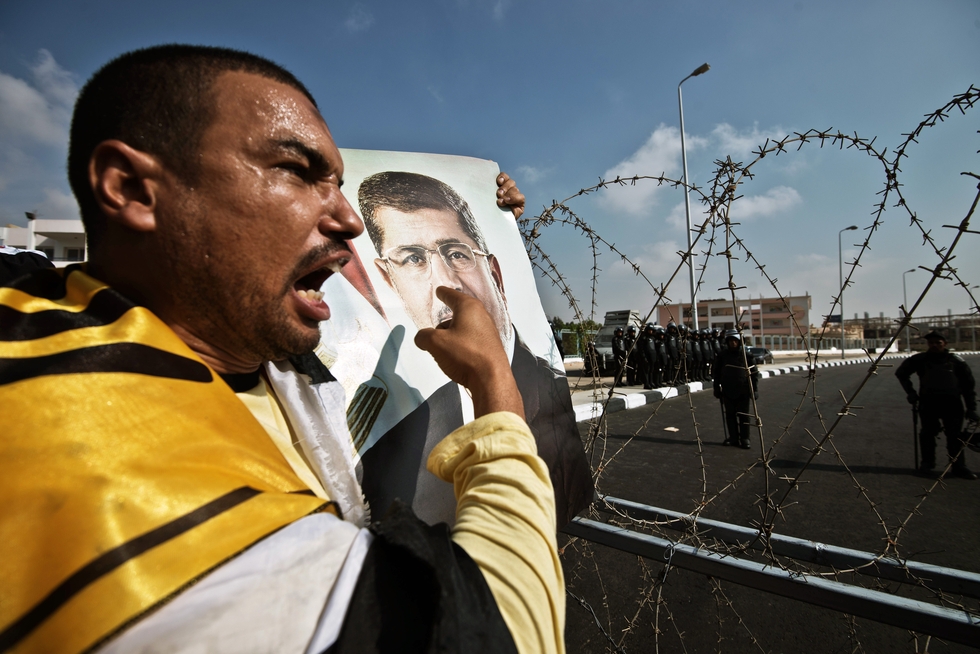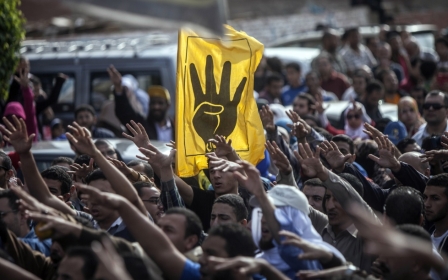UK MPs accuse government of obstructing political Islam inquiry

Furious MPs have accused the British government of “obstruction” after it refused to share the contents of Sir John Jenkins’ controversial secret report into the Muslim Brotherhood.
Crispin Blunt, the chairman of the parliamentary foreign affairs committee, which is conducting its own inquiry into “political Islam”, also told Middle East Eye that it was “unnecessary and regrettable” that Jenkins had declined to appear before the inquiry.
Blunt’s comments follow acrimonious exchanges in Westminster last week when members of the committee expressed concerns to Tobias Ellwood, the foreign minister for the Middle East, about the handling of the report and Jenkins’ refusal to appear.
They also ordered the British government to hand over documents showing its contemporary attitude to the military coup which supplanted Mohamed Morsi’s Muslim Brotherhood government in Egypt in July 2013.
Jenkins was in 2014 commissioned to conduct a review into the activities and ideology of the Muslim Brotherhood by then-prime minister David Cameron, but the full report has never been made public.
An 11-page summary of the main findings was published in December last year.
Blunt said that Jenkins was “probably by virtue of his study of the Brotherhood the premier expert in the field” and that his failure to appear as a witness for the committee would “impede transparency”.
Jenkins, who was the serving ambassador in Riyadh when he carried out his report, justified his refusal to answer questions on the grounds that he would only appear alongside a “serving minister”. But Ellwood insisted on appearing alongside a current official.
Jenkins has since retired from the Foreign Office, and now works as executive director of the IISS thinktank in Bahrain.
Speaking from Bahrain he told MEE that even though he had quit the foreign office he had a “duty of confidentiality to HMG [Her Majesty’s Government] and that put me in an extremely difficult position”.
The bruising public row over the Muslim Brotherhood review broke out as the committee’s formal inquiry into political Islam reached its final stages.
The committee is examining the Muslim Brotherhood’s relationship with democracy and assessing British policy towards political Islam.
During last week’s evidence session, Blunt told Ellwood that it had been “pretty clumsy... to appoint our ambassador to Saudi Arabia to conduct an inquiry into the Muslim Brotherhood”, suggesting that it opened the inquiry to allegations that the review was a “set-up job”.
Saudi Arabia regards the Muslim Brotherhood with deep hostility and categorises it as a terrorist organisation.
The Muslim Brotherhood, in a statement through ITN solicitors, has gone even further in its criticisms of the Jenkins report.
In evidence to the foreign affairs committee it accused the government of a “bad faith attempt to shore up commercial deals and alliances abroad”, suggesting that the report was intended “to damage the reputation of an Islamic movement that promoted democracy in the Middle East”.
Jenkins’ refusal to appear before the committee meant that no authoritative spokesman for the British government has been able to reply to such criticisms.
In his evidence before the committee Ellwood appeared to justify Egyptian President Abdel Fattah al-Sisi’s 2013 power grab, saying that there was “growing public despair at the mishandling of Eqypt’s economy” and a “rejection of the attempted Islamisation of the Egyptian state and society”.
He also called the coup against Morsi a “popular uprising”.
In reply, Blunt asked for “chapter and verse... on what interventions we actually made at the time with what was in effect then the Egyptian military authorities”.
Blunt demanded that documents should be handed to the committee by the end of this week.
The foreign affairs committee announced its inquiry into political Islam in March this year. Its report is likely to be published by the end of next month.
New MEE newsletter: Jerusalem Dispatch
Sign up to get the latest insights and analysis on Israel-Palestine, alongside Turkey Unpacked and other MEE newsletters
Middle East Eye delivers independent and unrivalled coverage and analysis of the Middle East, North Africa and beyond. To learn more about republishing this content and the associated fees, please fill out this form. More about MEE can be found here.



